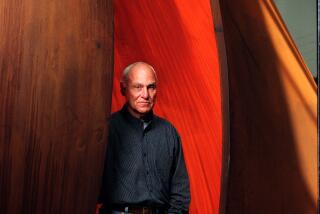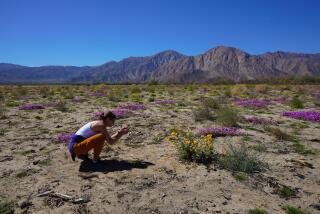Dennis Avery dies at 71; heir to label fortune, philanthropist
- Share via
Dennis Avery, who used his share of a family fortune to fund philanthropic ventures around the world and to commission artistic replicas of prehistoric creatures for a quirky sculpture garden in the desert of Borrego Springs, has died. He was 71.
Avery died Monday at Sharp Memorial Hospital in San Diego. No cause of death was given.
Avery was an heir to the fortune from the Avery Dennison Corp., which launched what is considered the first commercially viable marketing of self-sticking, peel-off labels, the kind of supplies now considered essential for offices, schools and home use.
His father, R. Stanton Avery, a classic rags-to-riches American success story, founded the business in 1935 after borrowing $100 to build a label-making machine out of spare parts. At his death at age 90 in 1997, his Pasadena-based company, which had merged in 1990 with Dennison Manufacturing of Framingham, Mass., had 16,000 employees and annual sales of $3.2 billion.
Dennis Avery was born in Los Angeles on Oct. 23, 1940. After graduating from Cambridge University in England, he received a law degree from California Western School of Law in San Diego, where he served as associate dean in the 1980s.
In the 1970s he worked for the San Diego city attorney’s office and was one of its first consumer fraud attorneys. Colleagues remember him as passionate about protecting consumers and not interested in just living off his inherited wealth.
“He loved the law and his Harley Davidson motorcycle,” said John Kaheny, who also worked in the office.
Avery and his wife lived for years in Borrego Springs, drawn by the open space and small-town atmosphere of the community 90 miles from San Diego. With his father’s eye for a good deal, Avery bought land when prices plummeted because of the savings-and-loan debacle of the 1980s and ‘90s.
Although he opted not to follow his father into the business world, he followed his example of using wealth for educational, artistic and other public causes.
His father was a patron of what might be called the artistic establishment of Southern California: the Los Angeles County Museum of Art, the Huntington Library art collections and the Performing Arts Council of the Los Angeles County Music Center, among others.
The son’s artistic interest leaned more toward the offbeat and populist. The artwork he bought and commissioned was not to be found in museums but in the open air of what he called the Galleta Meadows Estate in Borrego Springs.
Avery commissioned artist Ricardo Breceda of Perris to create metal sculptures of dinosaurs and other creatures, many from species that had once roamed Borrego Springs and other parts of Southern California: mammoths, wild horses, giant sloths, camels, birds of prey and saber-tooth tigers, among others. There are more than 120 sculptures in all.
Since he owned property throughout Borrego Springs, the sculptures dotted the landscape from nearly every angle. They quickly became a tourist attraction, much to Avery’s delight.
Although he was a serious student of prehistory, he shrugged off criticism that some of the creatures did not seem to conform to what scientists think they looked like. To Avery, art should be both educational and fun. He sometimes delighted visitors to the sculpture garden by giving his rendition of the sounds made by prehistoric animals.
“I’m old,” he jokingly told the Press-Enterprise of Riverside in 2008. “I’ve had a long life; I see these old animals and I feel young compared to them.”
One project that he commissioned with Breceda had a subtle social message: a representation of a dozen farmworkers from the early days when much of Borrego Springs was given over to a vineyard. To tourists and second-home owners flocking to the desert for fun and relaxation, the sculptures were a reminder that to some people the desert represented a life of toil in the blazing sun.
The face of Borrego Springs shows the expanse of Avery’s philanthropy and his interest in youth sports: a baseball park, lights for the football field, a skate park. He also supported Anza-Borrego Desert State Park. Many of his bequests were never acknowledged, and the extent of his giving is open to estimation.
Internationally, Avery funded an AIDS clinic in China, a drug rehabilitation center in Hong Kong and a library in Honduras. In San Diego, Avery and his wife, Sally Tsui Wong-Avery, were backers of a Chinese bilingual school, donating $6 million at one point.
Besides his wife, Avery is survived by his children Halina, Chris, Sara and Theodore; stepdaughter Natasha Wong; brother Russell Durfee Avery; and sister Judith Avery.
More to Read
Start your day right
Sign up for Essential California for the L.A. Times biggest news, features and recommendations in your inbox six days a week.
You may occasionally receive promotional content from the Los Angeles Times.



















































